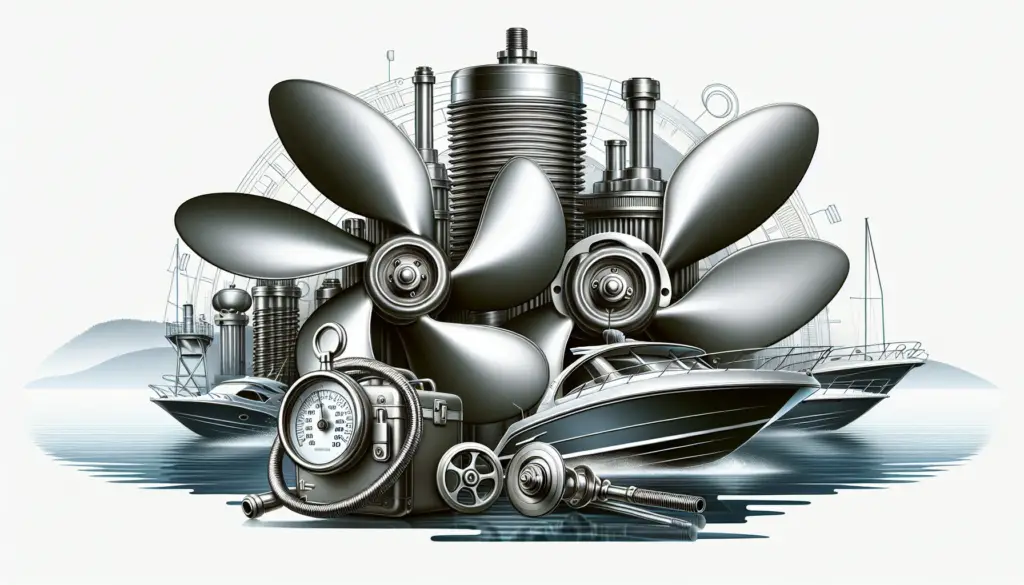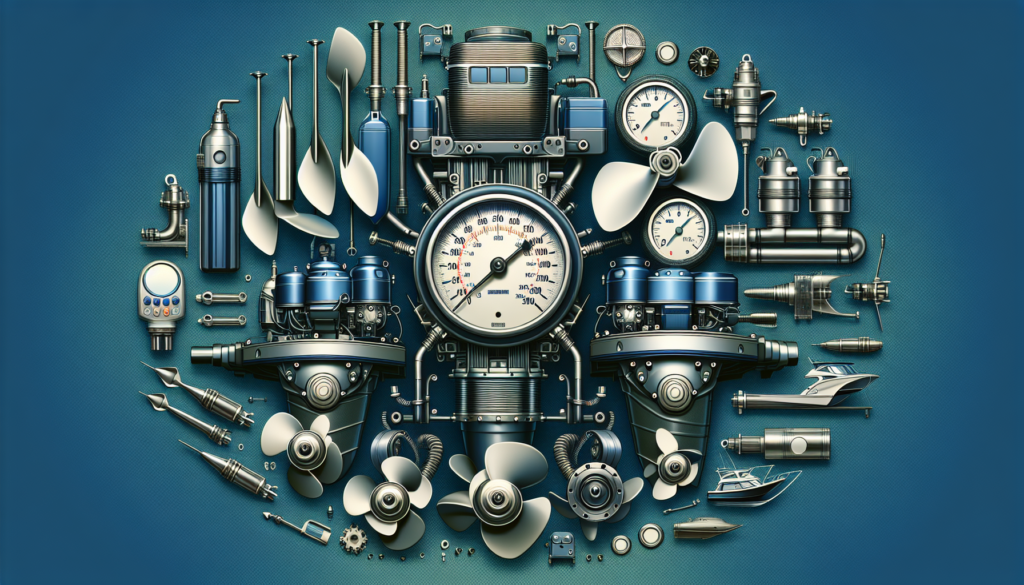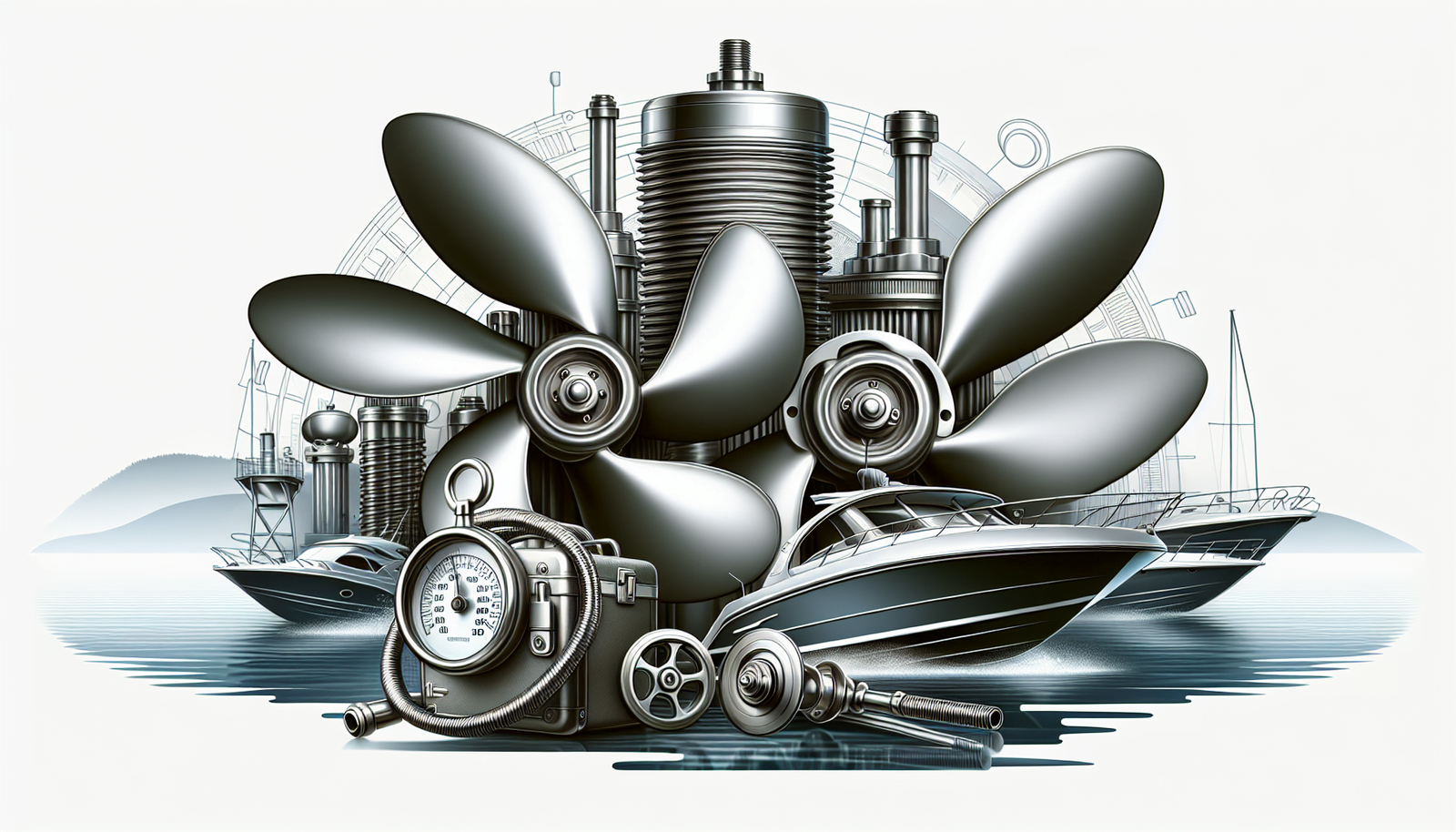In the thrills and spills of marine life, boat engine accessories may not seem like the most exciting topic. But trust me; when you’re adrift on the open water, the right part can make all the difference. From handy tools that keep your engine running smoothly to gadgets that enhance your boating experience, let’s navigate through the most popular boat engine accessories you should absolutely have onboard.

Engine Covers
When it comes to keeping your boat’s engine in tip-top condition, one of the essential accessories you’ll need in your kit is an engine cover. But what exactly are they, and why is there a need for them?
Types of Engine Covers
To begin with, you ought to know that there are several types of engine covers available in the market. The type of cover you choose largely depends on your engine’s specific needs and the conditions it is regularly exposed to. The options range from full covers that protect the entire engine to covers designed exclusively for the top or bottom part of the engine. There are also weather-specific covers, like waterproof or sun-proof covers, that offer additional protection against certain elements.
Benefits of Engine Covers
You might be wondering why there’s a need for an engine cover in the first place. Well, imagine having your vehicle parked in the harsh weather, be it a sunny day or a rainy one, without a protective cover. Chances are, your vehicle’s engine won’t have a very long life. An engine cover acts as a protective shield for your engine against water, dust, dirt, and sun damage. It significantly helps in prolonging the lifespan of your engine and ensuring optimal performance.
How to Select a Suitable Engine Cover
Choosing the right engine cover comes down to understanding your boat’s specific needs. Consider the size necessary for your boat’s engine and the conditions you’ll likely subject it to. Always be sure to check the material of the engine cover to ensure it’s sturdy and can withstand different weather conditions. Lastly, consider opting for covers from reliable manufacturers to guarantee the product’s quality.
Fuel Filters
Next up on the list of must-have boat engine accessories is the fuel filter. This tiny device plays a massive role in maintaining the health of your engine.
Role of Fuel Filters
In simple terms, a fuel filter cleans the fuel that goes into your engine. It removes any impurities, like dust, rust, and debris, which could clog the engine, causing damage and affecting its performance over time. So, if you want your engine running smoothly and efficiently, a fuel filter is a necessity.
Different Quality of Fuel Filters
Not all fuel filters are made equal. The quality differs significantly from one manufacturer to another, and so does its efficiency and durability. Premium-quality filters are usually made of high-grade material, promising a higher level of filtration which contributes significantly to the engine’s optimal performance.
Maintaining Your Fuel Filters
The key to a healthy engine doesn’t just end at installing a fuel filter; its maintenance is as crucial. Regular replacement at set intervals is a must to prevent buildup that could obstruct the fuel flow. Make sure to follow the manufacturer’s recommended interval for replacing the filter and visual checks from time to time also help in spotting any anomalies.
Propellers
Whether you’re sailing for fun or fishing, the propeller is an essential component of your boat that you can’t overlook.
Understanding Propeller Sizes
Choosing the right size propeller is a crucial factor in how your boat performs. The size consists of two parts – diameter and pitch. The diameter is twice the distance from the center hub to the tip of the blade, and the pitch is the theoretical forward distance a propeller travels during one revolution. Understanding these measurements can help you select the correct propeller for your boat.
Different Materials and Their Benefits
Propellers can be made of different materials such as aluminium, stainless steel or composite material, each with their own advantages. Aluminium propellers are affordable and have a reasonable life span, making it suitable for most low to mid-power boats. Stainless steel propellers are more durable and efficient, and they resist corrosion. The composite propellers are light-weight and ideal for emergency and high-speed motorboats.
How to Choose the Correct Propeller for Your Boat
Choosing the correct propeller begins with understanding your boat’s specific needs and the way you like to use it. Consider the size of your boat, the power of the engine, and the boat’s weight capacity when selecting a propeller. You may also need to consider the type of boating activities you usually engage in, such as fishing, water skiing, or leisure cruising.

Trolling Motors
Another game-changer in your boating experience is the trolling motor. They offer a smooth and quiet way to guide through the water.
Types of Trolling Motors
Trolling motors come in three main types: bow-mounted, transom-mounted and engine-mounted. Bow-mounted motors are installed at the boat’s front, offering excellent control and maneuverability. Transom-mounted motors, installed at the boat’s stern, are easy to install and handy for smaller boats. Engine-mounted motors are attached to the cavitation plate of an outboard motor, freeing up space on the boat.
Advantages of Having a Trolling Motor
If you enjoy fishing, a trolling motor can be your best friend. It allows you to sneak up on the fish silently, increasing your chances of a good catch. It also enables better control of your boat’s speed and direction and helps in maintaining your position in the water, offering a smoother and more enjoyable experience.
How to Choose a Trolling Motor
Selecting a trolling motor, like any other boat accessory, requires careful consideration. You need to consider the length, the weight of your boat, and the conditions you’ll be boating under. The shaft length is crucial for effective performance; too short, and it may not reach the water, too long, and it might cause navigation issues. The power or thrust needed for your motor also depends on the boat’s weight. The heavier the boat, the more thrust you need.
Battery Chargers
To ensure that you never run out of power in the middle of your boat journey, investing in a reliable battery charger is critical.
Features of a Good Battery Charger
A good-quality boat battery charger should be waterproof, resistant to vibration and shock, and compact enough not to take up too much space on your boat. It should also be capable of maintaining the battery at full charge without overcharging, potentially damaging the battery and shortening its life.
Portable vs. Onboard Battery Chargers
Portable chargers are handy for emergencies and short trips, allowing you to charge your battery from any location. On the other hand, onboard chargers provide the convenience of charging while the boat is in storage or moored, ensuring that your boat is ready to go anytime.
Maintaining Your Battery Charger
Regular checks and minor maintenance procedures can extend the life of your battery charger. Keep the charger clean and free from dust, dirt, and moisture. Ensure that the wires are not damaged and that the connectors are clean and tight.
Engine Flushers
Another must-have for every boat owner is an engine flusher.
Purpose of Engine Flushers
Engine flushers help clean and protect your engine by flushing out salt, silt, and other debris from the engine’s water passages, improving its performance and longevity.
Using an Engine Flusher Properly
It is important to operate the engine flusher properly for its effective function. The engines should be off and cool before using the flusher. Care must be taken to ensure that water pressure is sufficient for cleaning the engine but not too high to cause any damage.
Choosing the Right Engine Flusher
When choosing an engine flusher, consider its compatibility with your engine, quality, and durability. if your boat spends a lot of time in saltwater, opt for an engine flusher designed to remove salt effectively. Invest in a good-quality flusher to ensure effective cleaning and protect your investment in the long run.
Bilge Pumps
To ensure your boat’s safety, a bilge pump is a non-negotiable accessory.
Function of Bilge Pumps
Bilge pumps are used to remove bilge water (the water that collects in the lowest point on a boat). This is crucial because if water is not removed from the boat, it could create an unstable situation and potentially cause the boat to sink.
Manual vs. Electric Bilge Pumps
You can choose between a manual and an electric bilge pump. A manual pump is reliable and straightforward to install, and it gives a boat owner complete control over the operation. However, it requires manual effort to operate. On the other hand, an electric bilge pump works automatically but requires battery power. It’s a good idea to have both types for safety.
Crucial Factors to Consider While Buying Bilge Pumps
In selecting a bilge pump, consider the size of your boat, the amount of bilge water it typically collects, and the pump’s capacity to expel water. Additionally, the durability, reliability, and power consumption of the pump are also key aspects to consider.
Fuel Additives
Despite often being overlooked, fuel additives can significantly impact the efficiency and longevity of your engine.
Importance of Fuel Additives
Fuel additives are compounds formulated to enhance the quality and efficiency of fuels. They work to clean the fuel system, control moisture in the fuel, and reduce engine wear, resulting in better engine performance, improved fuel economy, and increased engine life.
Types of Fuel Additives
There are several types of fuel additives in the market, from injector cleaners, corrosion inhibitors, stabilizers, to anti-gel additives. Their usage depends on the specific needs or issues of your engine.
How to Use Fuel Additives Correctly
While fuel additives can be very beneficial, it’s vital to use them correctly. Always follow the manufacturer’s instructions for the recommended dosage and application. Overdoing it can result in engine damage rather than providing benefits.
Oil Extractors
Changing the oil in your boat engine is crucial for its effective operation, and an oil extractor can simplify this process significantly.
Utility of Oil Extractors
Oil extractors are tools used to remove engine oil from motor vehicles or machines. They can make the process of changing your boat engine’s oil cleaner, quicker and easier.
How to Use an Oil Extractor
Using an oil extractor involves inserting the extractor tube into the dipstick opening, pumping the handle to create a vacuum that draws the oil out of the engine and into the extractor. The used oil is collected in a container for easy disposal.
Choosing an Oil Extractor
When choosing an oil extractor, consider factors such as its capacity, the type of fluid it can extract, the length and diameter of the extraction tube, and how easy it is to use and clean.
Steering Systems
Lastly, a good steering system is a critical component of your boat, providing you with control over the boat’s direction and ensuring safety.
Key Components of Steering Systems
A boat’s steering system is made up of several components including a steering wheel, helm, cables or hydraulic lines, and a linkage to the rudder or outboard motor. Each component plays a vital role in ensuring exact control of the boat.
Types of Boat Steering Systems
Boat steering systems come in different designs, including mechanical systems such as rotary and rack and pinion systems, hydraulic steering systems, and more recently, electronic steering systems. The choice among these depends on factors like the boat’s size and the horsepower of its engines.
Maintaining Your Boat’s Steering System
Proper maintenance of your boat’s steering system is important for ensuring its longevity and performance. Regular inspection, cleaning and lubrication of the steering system, replacing any worn-out parts, and keeping a check on the hydraulic fluid levels form part of the essential maintenance practices.
In conclusion, these boat engine accessories, from engine covers, fuel filters, and propellers, to steering systems and more, are essential for maintaining your boat’s health and optimizing its performance. So make sure to equip your boat properly and happy boating!

